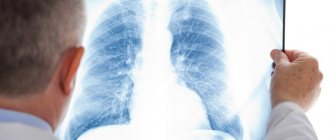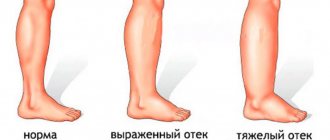Facial swelling is not only a cosmetic defect; if it appears frequently or is accompanied by redness and pain, it is a sign of quite serious health problems that need to be identified and treated.
ALENA PARETSKAYA
Pathophysiologist, immunologist, member of the St. Petersburg Society of Pathophysiologists ANDREY GRACHEV Leading cardiologist of the SM-Clinic holding, MD, academician of the Russian Academy of Medical Sciences
Facial edema is not a separate disease, but only a reflection of an imbalance between retention and excretion of fluid in the body. But what problems in the body can cause the face to swell and how serious is it?
Why does the face swell in adults?
Swelling on the face can occur at different times of the day - mainly in the morning or late afternoon, or they persist throughout the day, decreasing or increasing.
There are two types of reasons:
- physiological (or natural, not associated with diseases), they are usually not pronounced, not very strong, and disappear quickly;
- pathological, can be very strong, with changes in facial features, signs of inflammation, and are often quite persistent.
Each type of edema has the most typical causes; they occur mainly in the morning or evening hours, or do not depend in any way on the time of day. These characteristics are important for the doctor so that he can identify the leading causes and determine the tactics of examination and treatment.
Diagnostic stages
Consultation and examination by a therapist. After a detailed conversation and medical examination, the patient can be referred for consultation to other specialists depending on the etiology of the disease: cardiologist, allergist, endocrinologist, nephrologist, urologist, etc.
Laboratory research. First of all, the following are carried out:
- general (with leukocyte formula) and biochemical blood tests;
- general urine analysis.
- Instrumental studies:
- ECG;
- echocardiography;
- Ultrasound of blood vessels of the lower extremities;
- X-ray of the chest organs.
Next, the doctor prescribes a set of studies on an individual basis in each individual case.
To effectively eliminate swelling, you need to know exactly what disease is causing it. Edema is not an independent disease, but a symptom. Diagnostics using modern equipment will allow us to determine the cause of the pathology. The information obtained allows the doctor to choose the most effective treatment. Don't put off taking care of your health until later. Schedule a consultation with your doctor today to stay energized for years to come.
sign up for a consultation
Is there swelling on the face due to heart disease?
Yes, these questions usually worry women, says cardiologist Andrei Grachev.
They run to see a cardiologist when they can’t put a ring on their finger in the morning because it’s swollen or put on makeup because their face is swollen. The patient wants to look great, regardless of age and health status. And this is commendable. Men, as a rule, do not contact a cardiologist with such questions. The peculiarity of this issue is due to the fact that in patients with cardiovascular diseases, as a rule, swelling on the face appears at the final stage of a complication such as heart failure. First, they appear on the legs (the lowest point in relation to the heart), then fluid accumulates in the abdominal cavity, the liver and spleen enlarge (as a blood depot). And only after the fluid reaches the pleural cavities and the heart sac, swelling may occur on the face or hands.
Reasons for development
The veins in the legs have valves that act as "check valves" to prevent blood from flowing into the legs due to gravity. The heartbeat pushes blood through the arteries down to the legs. The blood must return to the heart to be recirculated through the veins. Blood pressure through the system and contracting leg muscles push blood up the veins, while valves prevent backflow down against gravity.
Valve insufficiency allows blood to pool in the legs and feet, eventually leading to swelling. When blood stagnates or pools in an area, fluid leaks into the surrounding tissue.
Valve insufficiency can occur for the following reasons:
- with age;
- from standing for long periods of time;
- from sitting for many hours;
- from varicose veins.
Regardless of the cause, as the valves in the legs become dysfunctional, blood pools and causes swelling, which puts pressure on the veins, causing them to widen and widen. This prevents the valves from working effectively, leading to even more swelling.
Main reasons for development:
- kidney diseases: glomerulonephritis, nephrotic syndrome, renal failure;
- heart diseases: heart failure;
- vein lesions (varicose veins, inflammation, thrombosis);
- liver diseases: cirrhosis of the liver, blockage of the hepatic veins;
- diseases of the endocrine system: hypothyroidism, diabetes;
- severe cancer;
- nutritional dystrophy;
- pregnancy;
- allergic reactions: insect bites, contact with an allergen.
Depending on the type, swelling can lead to retinal detachment, stroke, seizures, and even death. It is unacceptable to ignore the problem. To determine the cause, sign up for a consultation with specialists at the Yauza Hospital.
When do they occur most often?
Due to a number of circumstances, adds cardiologist Andrei Grachev, such as the flow of fluid to the upper half of the body in a lying position, changes in the biorhythms of hormone production (more often their active synthesis occurs at night or in the early morning hours), edema syndrome most often manifests itself in the early morning hours .
Morning
If we talk about physiological reasons, morning swelling is usually associated with constant lack of sleep, fasting or strict diets (limiting protein and fats). Sometimes swelling in the morning is caused by the wrong selection of skincare products (face cream, toner or cleanser). Also, morning swelling of the face can be caused by crying or stress in the evening or at night.
Possible swelling of the face in the morning due to an incorrectly selected pillow (it is too high, it provokes a narrowing of the blood vessels in the neck). Another physiological factor is an excess of fried, salty foods or liquids taken in the evening, before bed. In women, facial swelling in the morning can be caused by hormonal fluctuations, PMS or pregnancy. Some women report morning swelling during menopause.
Pathological causes of morning edema are mainly kidney damage. Such swelling is usually soft, mobile, appears on the face after sleep, and the skin acquires a waxy or yellowish tint. The most common causes of facial swelling are:
- glomerulonephritis - the acute form of the disease leads to edema, which lasts up to 2-3 weeks, if the process enters the chronic phase, edema is typical for periods of exacerbation of inflammation;
- Kidney amyloidosis - edema is typical of the second stage (proteinuria), when protein loss occurs and kidney function gradually deteriorates;
- membranous nephropathies - occur after taking certain medications, tumor therapy, acute infectious pathologies. Edema occurs in waves, with sharp or barely noticeable symptoms;
- chronic kidney disease (previously called renal failure) - swelling occurs gradually as renal damage progresses;
- kidney damage in severe systemic pathologies - edema is typical for nephropathy due to diabetes or systemic lupus erythematosus.
Evening
Sometimes facial swelling becomes noticeable in the evening, especially after an active day. Often this is one of the manifestations of pathologies of the cardiovascular system. Often, swelling of the face is accompanied by severe swelling in the area of the extremities - hands and feet, legs. These swellings are denser, the skin has a lower temperature than on other parts of the body, and such swelling goes away slowly. Often occur against the background of the following pathologies:
- amyloidosis of the heart and blood vessels;
- cardiomyopathy;
- sclerotic heart disease (cardiosclerosis);
- certain types of arrhythmia;
- constrictive pericarditis;
- some heart defects;
- arterial hypertension;
- cardiac lesions due to rheumatism.
Day
Sometimes facial swelling is most pronounced during the day or its appearance is not clearly related to the time of day. Among the main pathologies that lead to such edema are endocrine disorders - especially a lack of thyroid hormones (hypothyroidism). Facial swelling is especially pronounced with congenital hypothyroidism, in pregnant women or with autoimmune thyroiditis, cytokine-induced thyroiditis.
Rapidly increasing swelling of the face during the day can be a sign of allergies - to food, insect bites, cosmetics, medications and even cold. Sometimes facial swelling occurs during an attack of bronchial asthma due to difficulty breathing and fluid retention in the veins.
Facial swelling is possible in people who smoke and drink alcohol. This is due to the increased work of the lymphatic system to remove toxins from tissues.
Severe swelling of the face during the day is possible with respiratory infections and their complications - sinusitis, tonsillitis, frontal sinusitis. Swelling of the face is possible with a deficiency or excess of vitamins (especially fat-soluble ones).
General recommendations for troubleshooting
The first and main recommendation is to start leading a healthy lifestyle:
- Regular sleep of 8–10 hours.
- Balanced diet with reduced amount of salts. Reduce consumption of carbonated drinks, coffee, fatty, smoked and fried foods.
- Introduce natural diuretic foods into your diet: citrus fruits, carrots, watermelons, apples, melons, etc.
- Quit smoking and alcohol abuse.
- Drink diuretic teas, fruit drinks and infusions from: lingonberries and their leaves, cranberries, blackberries, viburnum, rowan.
- If swelling appears after sleep, change the pillow to a higher and more elastic one.
And, of course, just in case, you should consult a doctor about the causes of this problem. Because in this case, self-medication can only be done when you know that the disorder is not caused by a serious illness.
For example, swelling of the cheeks often appears as a result of injury, diseases of the teeth and oral cavity, allergies, inflammation of the lymph nodes and other diseases.
Only special medications should be used against allergies; other methods will not help. And swelling associated with inflammation of the facial nerve should not be treated with various cold compresses, as they will only worsen the situation. Therefore, if your cheeks for no apparent reason begin to look somehow wrong, you should contact the clinic.
You can reduce the likelihood of swelling after sleep with the help of diuretics:
- Natural. We have partially listed foods and drinks with this effect above.
- Medical. These include Torasemide, Amiloride and others. You can also try to relieve swelling with Leoton gel, which is primarily used for the legs. Since the gel is not intended for the face, it must be used with great caution, avoiding contact with the eyes.
The use of medications and diuretics should be agreed with doctors. Here are a few more recipes to improve fluid circulation in tissues:
- Diuretic based on blackberries. You need 80 grams of blackberry leaves, and 10 grams of coltsfoot leaves and birch leaves. The ingredients are mixed and poured with boiling water (1:2). Then keep in a water bath for 15 minutes. The resulting infusion is filtered. The decoction should be drunk in the morning and afternoon, one glass at a time. Usually the course takes up to one and a half to two weeks.
- An infusion of bear's ear herb has an antiseptic effect on the urinary system, so it will be especially useful for kidney diseases. Here you need 1 tbsp. collection spoon. It is poured with a glass of hot water and left in a thermos for 2 hours. The resulting infusion is filtered. You need to take the product 2 times a day, half a glass.
- Flax-seed. It helps remove excess fluid well. For the effect, you need to eat 1 teaspoon of ground seeds daily. They can also be added to porridges and other dishes, since they do not have a pronounced or unpleasant taste and smell. Duration of treatment – 1 month.
How to quickly relieve facial swelling in adults
If this is physiological swelling of the face, not associated with serious pathologies that require medical supervision and the use of selected medications, excess fluid can be eliminated through certain simple measures and actions.
Taking a contrast shower or washing with cold/hot water. This method refreshes, increases tissue tone, enhances the outflow of fluid from the skin and reduces swelling.
Using ice – a couple of pieces of ice will help deal with swelling on the face quickly and effectively. In addition, you can prepare herbal decoctions with a tonic effect in advance and freeze them, using them for washing.
Facial massage is an effective remedy that helps improve microcirculation and swelling. Manual massage, the use of rollers, ice cubes, and cold spoons help. Sometimes you can first wipe your face with green tea and apply compresses with it to your face and eye area.
Excess salt, sugar, consumption of processed foods
Potassium and sodium play an important role in controlling water balance in the body: sodium attracts water into cells, potassium pushes it out of tissues.
Sodium is involved in regulating blood pressure and fluid levels in the body. Excessive amounts lead to water retention.
The main sources are salt and processed industrial products: sausages, chips, crackers, canned goods and cheeses.
If you ate a whole bag of chips the day before, the weight gain in the morning is water, not fat.
| Drinking water and foods rich in potassium and magnesium will help regulate sodium balance and remove excess fluid from tissues. These are dark greens, beans, bananas, avocados, tomatoes, yogurt. |
Sweets (simple carbohydrates) can also cause swelling. Water is required to “package” carbohydrates into glycogen in the liver and muscles. For every gram of glycogen, there are four grams of water. Elevated blood glucose levels increase the release of insulin, which leads to salt and water retention.
That's why people on low-carb diets lose pounds in a short time - the fluid just goes away.
Passive lifestyle
A sedentary lifestyle leads to stagnation of lymph and water retention in tissues; physical activity helps improve this situation.
The lymphatic system does not have its own pump, like the circulatory system. Therefore, the movement of lymph and the return of fluid to the blood depends on the functioning of skeletal muscles.
When you sit for a long time, the pressure in the capillaries increases and fluid begins to accumulate. Get up at least once an hour and stretch your legs , ankles, rise on your toes and wiggle your toes.
Taking Dandelion Extract
Common dandelions are a medicinal plant that has a natural diuretic effect. Infusions and decoctions of dandelion root are used at home to introduce excess moisture to reduce the severity of swelling.
The active substances in the decoction signal the kidneys to more actively filter water and salts, increasing the volume of urine excreted. Over the next 5 hours, the work of the renal glomeruli intensifies, filtering more urine. It is important to consult your doctor first. There are certain restrictions - pathologies of the kidneys, heart or liver.










